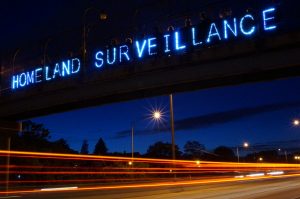If you’re like most people in the U.S., you’ve never heard of Section 702. It’s a little known surveillance law that is part of the Foreign Intelligence Surveillance Act (FISA). Section 702 permits the government to collect the content of communications of “targets” who are “non-Americans” located abroad, including communications they may have with Americans. The short version is this: Section 702 has loopholes that expand state surveillance of both immigrant and citizen people of color.

Yesterday, October 4, 2017, the USA Liberty Act of 2017 — a draft bill from the House Judiciary Committee to reauthorize and reform Section 702 — was made public. Section 702 is set to expire at the end of this year — this bill would extend Section 702 for six years with reforms.
CMJ has urged Congress to let Section 702 surveillance authority expire, since the comprehensive reforms we demanded seemed unlikely. This new drafted bill confirms our fears.
As proposed, the bill would require the government to obtain a warrant before viewing content collected under Section 702 in certain criminal contexts, but continues to allow access to this information for broad “foreign intelligence” purposes without a warrant. The bill also prohibits “about” collection until September 2023. “About” collection is an unlawful practice the NSA employed until April 2017 that allows for warrantless spying on Americans’ communications that are about a foreigner under surveillance. (ACLU)
According to our friends at the Open Technology Institute, the draft bill would make some important reforms, like codifying the end to upstream “about” collection and requiring a warrant to access the contents of Section 702-acquired data in response to searches for evidence of a crime. Still, some important things are missing from the bill.
The bill doesn’t include vital reforms like:
- A limitation on the scope of collection to prevent surveillance for broad foreign affairs purposes unrelated to national security including targeting people abroad like activists, lawyers, journalists, and businesspeople;
- Protections against the warrantless querying of metadata, or the warrantless access to communications contents for foreign intelligence purposes;
- Use limitations to ensure that information collected for national security purposes cannot be used in investigations and prosecutions that are wholly unrelated to national security;
- A clarification to ensure that criminal defendants are provided notice if information derived from Section 702 surveillance played any role in their investigation or prosecution; and
- A requirement for the Office of the Director of National Intelligence to conduct an estimate of the number of Americans’ communications that have been “incidentally” collected under Section 702, and make that number publicly available. (OTI)
The bottom line is that the proposed bill fails to close the so-called ‘backdoor search loophole.’
Neema Singh Guliani, legislative counsel for the American Civil Liberties Union, said:
“The bill would still allow the CIA, NSA, FBI, and other agencies to search through emails, text messages, and phone calls for information about people in the U.S. without a probable cause warrant from a judge. Those worried that current or future presidents will use Section 702 to spy on political opponents, surveil individuals based on false claims that their religion makes them a national security threat, or chill freedom of speech should be concerned that these reforms do not go far enough.
We urge members of the House Judiciary Committee to strengthen this bill as it moves forward.”
Malkia Cyril, executive director of the Center for Media Justice, agrees that the bill must be overhauled or expired, and added:
“Under the current administration, or any administration, we can’t risk expanding surveillance authority in ways that risk basic human and civil rights. These partial reforms to Section 702 do just that. Without full and complete overhaul of these rules, they should be allowed to expire.
For the communities of color, both immigrant and citizen, who stand to be unjustly impacted by this reauthorization — the issue is beyond preventing warrantless surveillance. That is 101 constitutional protection. We cannot grant exhaustive surveillance authority to the same administration and law enforcement agencies we are battling for basic constitutional protections, and fundamental human rights.”
If you want to learn more about Section 702 and why it’s especially dangerous for people of color, check out this article in Wired written by Center for Media Justice (CMJ) Organizing Director, Steven Renderos, and Ken Montenegro of the National Lawyers Guild and MAG-Net member, Advancing Justice LA.



